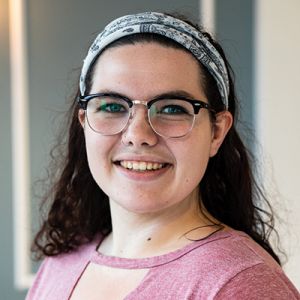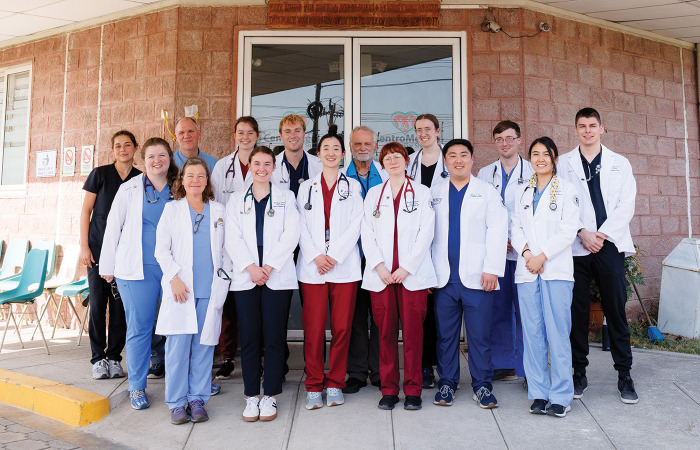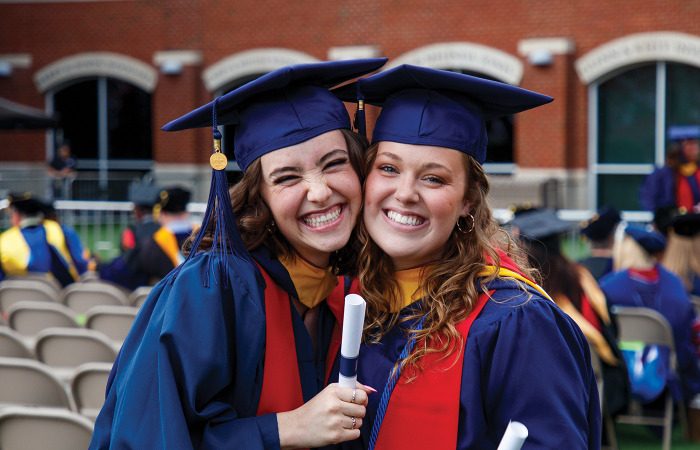This story is part of a feature package, “Opioids: A National Crisis,” about how Liberty University is helping to put the spotlight on a major issue through a series of town hall events across the country.
Several Liberty University students addressed host Eric Bolling, First Lady Melania Trump, or visiting cabinet members during a televised town hall on the opioids crisis on Nov. 28, 2018, at Liberty’s Vines Center. Below are the perspectives of two students who participated in the Q & A portion because of their personal connections to the crisis.
Student shares tragic story of losing her mother to opioid overdose
 Graduate student Kiley Shionis was sitting in a friend’s apartment in February 2017 when she got the phone call from her aunt that her mother had died.
Graduate student Kiley Shionis was sitting in a friend’s apartment in February 2017 when she got the phone call from her aunt that her mother had died.
She was first told that her mother had a heart attack, but Shionis, who had watched her mother struggle with drug addiction for many years, later learned that she died from a drug overdose.
“I had seen my mom a month before, and I thought she was doing better than I had seen her in a long time. My guess is that it was a relapse, that she had gone back to her normal dosage of heroin but took some laced with fentanyl. It was a heavy dosage. It would have killed a lot of people, not just her. It could have been anyone, but it happened to be
my mom.”
Shionis was about 6 when she began to notice her mom’s addiction and had to live with the “harsh reality” of her mother’s struggle every day.
“I remember being very little and seeing things that I probably shouldn’t have seen,” she said. “She was clean for three or four years, and then she relapsed when I was in middle school. Then she was clean, and then she relapsed again when I was 16. I decided to leave my house then.”
After Shionis learned of her mom’s death, the Liberty community came around to support her. Senior Vice President for Spiritual Development David Nasser reached out to her, and classmates quickly raised money for a plane ticket home. In the months that followed, Shionis wanted to bring awareness to the opioid crisis through her family’s story.
She started opening up to others about her mother’s drug addiction. “We need to talk about it and share experiences,” she said.
That’s why the first lady’s visit was important, Shionis said. It wasn’t just about the chance to see a high-profile guest but to hear about the work she was doing to shine light on the opioid crisis, addictions, and the real families who have been affected.
“Those who haven’t seen the effects of addiction firsthand have a lot of questions,” she said. “That’s why I was so glad Liberty was opening that door.”
Shionis asked Bolling what college students can do to raise awareness. He said if you see someone who may be struggling, the best thing you can do as their friend is talk to them and then get them help.
“They won’t be mad at you for getting them some help,” he said. “We need to lift the stigma of opioids. As administrators, as elected officials, we also need to say, ‘If you have a problem, we need to get you help.’ We need to say, ‘Let’s work through this together.’ We’ll save lives that way.”
Nursing student wants to fight drug abuse in her future career
 Senior nursing student Mollie Burr was well educated on the horrors of opioids before coming to Liberty. Burr is from northern Maine, which is among the top 10 states with the highest rates of opioid deaths, according to the National Institute on Drug Abuse.
Senior nursing student Mollie Burr was well educated on the horrors of opioids before coming to Liberty. Burr is from northern Maine, which is among the top 10 states with the highest rates of opioid deaths, according to the National Institute on Drug Abuse.
“Growing up, I knew who was on opioids or who was selling it,” she said. “I love that Liberty has taken a stance and opened up the topic. While I grew up knowing about drugs and the opioid crisis, not every student at Liberty has.”
As a nursing student, Burr said it was especially meaningful to hear the first lady discuss neonatal abstinence syndrome (NAS), which affects newborns whose mothers have been addicted to opioids. (A month before her visit to Liberty, Melania Trump met with staff who treat newborns with NAS at Thomas Jefferson University Hospital in Philadelphia.)
“Babies are being born addicted to opioids, and it’s very different than normal drug addiction,” Burr said. “No one deserves to start off their life addicted to drugs. That’s not a choice that baby is making; it’s not fair to them.”
During her clinical rotations, Burr shadowed local nurse and Liberty alumna Shannon Miles (’13) at Virginia Baptist Hospital in Lynchburg. Miles has become an advocate for babies born with NAS and helped start the Roads to Recovery Inc.’s Residential Recovery Program for Pregnant and Postpartum Women. The program provides safe housing for mothers to recover from addiction so they can care for their babies; mothers can stay for up to a year after giving birth. The program also offers in-house counseling.
“I think it’s interesting to see that opioid addiction is in Lynchburg’s backyard,” Burr said. “There are people who live two minutes from campus, and this is their struggle.”
Burr said Liberty’s nursing program has better equipped her to fight the opioid crisis as a medical professional. She said she’s already learned so much about the topic through School of Nursing seminars and courses on responsible pain management and addiction. She said the issue of opioid abuse is affecting so many areas of our culture.
“There’s movies, books, and this topic is evolving and becoming more mainstream,” Burr said. “A lot of addicts are functioning addicts. You’re going to run into people who are battling addiction. It could be your neighbor or your co-worker or someone who sits next to you in church.”
Burr asked Bolling if treatment centers would have a bigger impact if they focused more on the mental health aspect of addiction. He said that while the government is working well on the enforcement side of the crisis, he agrees that better treatment is needed. The latest round of government funding is being put toward awareness and recovery, he said.
“Slowly but surely, we’re making a difference here. There will be millions of people who see this town hall. Let’s get the word out that we care. Let’s get the word out that addicts aren’t bad people; they need help.”




